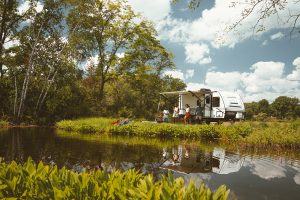
Spring and summer are the best times to go camping, but they are also the most unpredictable when it comes to weather. The skies may be sunny and blue when you leave for your camping trip, but storm clouds can form quickly and you could be caught in a storm. Severe thunderstorms can occur any month of the year, but they are most likely to happen during prime camping season.
RV owners and enthusiasts know they should always be prepared for changing weather conditions. Whether camping in the rain or amid an intense thunderstorm, you should always be prepared and have an RV emergency kit. But there are things you should do immediately before and during the storm to keep you, your loved ones and your RV safe.
Keep an Eye on the Forecast while RV Camping
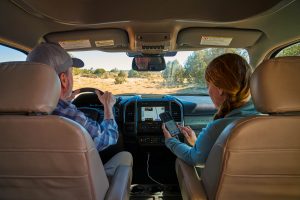
The best way you can keep yourself safe while camping is to stay alert and informed. When preparing for severe weather, you should get into the habit of visually monitoring the weather at all times, even if the weather is calm. If you have access to the internet or cell reception, it is a good idea to check the weather forecast for the entire duration of your trip. Make sure you have enabled severe weather alerts on your phone. Also, make sure you have weather apps installed on your phone so you can have easy access to the most up-to-date information. Knowing the forecast early can give you more time to plan for whatever Mother Nature sends your way.
How to Prepare Your RV Campsite Before a Severe Thunderstorm
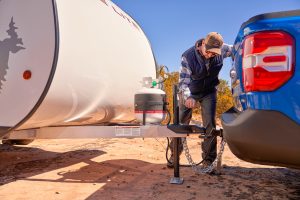
Camping during a severe thunderstorm is nothing like camping in the rain. The National Weather Service (NWS) considers a thunderstorm severe if it produces hail at least three-quarters of an inch in diameter, has winds of 58 miles per hour or higher or it produces a tornado. Hail this large can cause significant damage to your RV. Strong winds are capable of breaking off large branches or knocking over trees at your campsite. Campers also need to be aware of lightning, one of the most dangerous aspects of a thunderstorm. Here are some general tips for RV campers ahead of severe thunderstorms:
- Secure your RV. Tie down or put away things like chairs, grills and other small objects that can become projectiles in high winds. Make sure your outside storage doors are closed and locked. Retract your awning and ensure it is securely fastened. Close and latch your windows. Get your emergency preparedness kit out.
- Secure your site. If your site has trees and shrubs, keep an eye out for weak branches that could break under high wind conditions. Falling branches can cause severe damage during a storm.
- Have an evacuation plan – If you decide to evacuate, leave early. Check local forecasts and weather apps to ensure that you aren’t heading in the direction of the storm. Make sure your RV’s gas tank is full in the event of an evacuation.
- Take cover before the storm arrives. If you can’t evacuate, the safest place to go is a basement of a sturdy building. The next safest is an inside room with no windows and plenty of walls between you and the storm.
Tips for RV Campers Caught in a Severe Thunderstorm
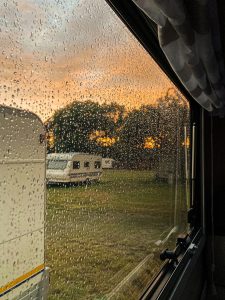
The safest location during a severe thunderstorm is inside a large enclosed structure with plumbing and electrical wiring. While camping you may not have access to a space like this but there are still ways you can protect yourself.
- If you don’t have a building, take shelter in a car or truck. The National Weather Service (NWS) advises you to hunker down in a vehicle and keep the windows shut. Certain RVs can be blown over in high winds. If you have no other alternative, try to stay in a hallway or in an area that is away from windows and cabinets that can fly open.
- If you see lightning or hear thunder, stay inside. The NWS warns that when thunder roars, you should go indoors and stay there until 30 minutes after the last clap of thunder.
- Avoid power surges and conductive materials. Unplug electronics and opt for cell phones and battery-powered devices. According to the NWS, you should avoid touching any plumbing or metal. Don’t do anything with running water including washing dishes and showering.
Don’t let Severe Weather Ruin Your RV Trip
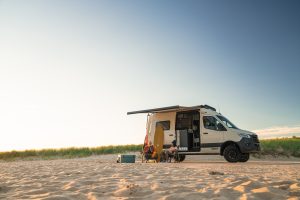
Whether you are camping in the rain or find yourself in a severe weather event – the most important thing you can do is be prepared. Don’t let the risk of severe weather ruin a trip or keep you from heading into the wilderness. Check out the General RV Emergency Kit Essentials Guide to help you prepare your RV for adventure. Visit the Parts Department at your local General RV Center to pick up gear to help you prepare for severe weather. Plus check out our great selection of towing equipment, camp kitchen gear, and more! If you have any questions, our RV experts are ready to help.